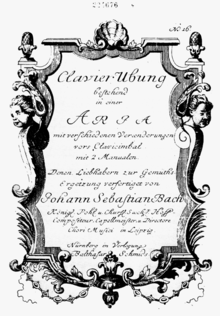The loser
Der Untergeher is a novel by the Austrian writer Thomas Bernhard from 1983 . It tells the professional and private careers of three aspiring concert pianists , one of whom is Glenn Gould , and their lifelong struggle with the demand for the highest level of perfection.
action
The central characters of the novel are three piano virtuosos: Glenn Gould, Wertheimer (“Der Untergeher”) and the first-person narrator . The novel begins with the first-person narrator entering an inn in the Upper Austrian town of Wankham . He comes from Wertheimer's funeral in Chur and at this point is the only survivor of the three protagonists. He reflects on their common (and parallel) life and the reasons for the friend's suicide . This happens on three time levels: the prehistory, the moment of memory of this prehistory (when entering the Wankhamer Gasthaus) as well as the time of writing down the memory of the prehistory.
Gould, Wertheimer and the first-person narrator met in 1953 when they were simultaneously studying with “Horowitz” at the Mozarteum in Salzburg . All three strived for “only the highest” in art and made the greatest demands on themselves throughout their lives. When they recognized Gould's genius while practicing and performing the Goldberg Variations and the art of the fugue , Wertheimer and the narrator gave it Playing the piano without any problems. They realized that they would never be able to reach this level of perfection.
Wertheimer, whom Gould nicknamed Der Untergeher , pursued idleness for the next 28 years and kept his sister in an oppressive relationship in their shared apartment in Vienna until she separated from him. She marries a rich Swiss named Duttweiler and moves to Chur in Switzerland. Almost at the same time, Gould dies after an extremely successful career. Wertheimer kills himself in front of his sister's house. The narrator had his after discontinuation of studies Steinway - wing away and is limited in the following years on, always a paper entitled About Glenn Gould to begin his career he pursued, but to discard each. He moves from Vienna, which is becoming a burden for him, to Madrid .
The narrator wants to go back to Madrid via Vienna, where he still has an apartment, but stops in Wankham to visit Wertheimer's house in Traich again. He enters into this towards the end of the novel. On the record player he finds Gould's Goldberg Variations , which he begins to hear again.
The novel is preceded by a motto : "Long predicted suicide, I thought, not a spontaneous act of despair."
Formal aspects
Like many of Thomas Bernhard's novels, Der Untergeher also has long passages without paragraphs. Right at the beginning there are three sentences - the “fourth paragraph”, however, extends to the end of the book. The loser rarely contains direct speech, always immersed in the fictional author's memory and next to it fragmentary quotations in italics. With idiosyncratic punctuation, Bernhard inserts pause signals into the text at unusual places.
Fiction and reality
Glenn Gould
Authentic and fictional material is interwoven in the novel . The fictional character Glenn Gould differs significantly from the real person in some points. Gould did not study in Salzburg and also not with Vladimir Horowitz, who stylistically embodied the opposite. Gould turns 51 in the novel, whereas in reality he died a few days after his 50th birthday - not sitting at the piano, as described in the novel.
Goldberg Variations
According to Liesbeth M. Voerknecht, the genesis of the Goldberg Variations is satirized in the novel. The connection to the two folk songs of the Quodlibet was made by the landlady and the woodcutter , and the form and numbering of the Goldberg Variations were taken up in the Untergeher . The word Aria appears twice, the word Goldberg Variations 32 times and in the introductory paragraphs, similar to the Aria, thematic material is exposed, which in variations determines the entire novel.
expenditure
- First edition: Suhrkamp, Frankfurt am Main 1983, ISBN 3-518-04507-5
- Library Suhrkamp : Frankfurt am Main 1986, ISBN 3-518-01899-X
- Licensed edition of the Volk und Welt publishing house for the GDR: Berlin 1986, ISBN 3-353-00037-2
- Paperback: Frankfurt am Main 1988, ISBN 3-518-37997-6
- Süddeutsche Zeitung Library: Munich 2004, ISBN 3-937793-04-6
- Work edition, Volume 6: Frankfurt am Main 2006, ISBN 3-518-41506-9
Adaptations
In 2013 Christiane Pohle directed a stage version of Der Untergeher at the Schauspielhaus Graz . The Brooklyn Academy of Music realized a one-act opera by David Lang in 2016 based on the novel.
literature
- Barbara Diederichs: Music as a generation principle of literature. An analysis using the example of Thomas Bernhard's Untergeher . Diss. Giessen 1999 ( DNB )
- Liesbeth M. Voerknecht: Thomas Bernhard and the music. The loser. In: Joachim Hoell, Kai Luehrs-Kaiser (Ed.): Thomas Bernhard: Traditions and Trabanten . Königshausen and Neumann, Würzburg 1999, ISBN 3-8260-1695-5 , pp. 195-199
Individual evidence
- ↑ Philipp Löser, media simulation as a writing strategy. Film, Orality, and Hypertext in Postmodern Literature . Vandenhoeck & Ruprecht, Göttingen 1999, ISBN 3-525-20581-3 , p. 210
- ↑ Liesbeth M. Voerknecht: Thomas Bernhard and the music. The loser. In: Joachim Hoell, Kai Luehrs-Kaiser (Ed.): Thomas Bernhard: Traditions and Trabanten. Königshausen and Neumann, Würzburg 1999, ISBN 3-8260-1695-5 , pp. 195-199.
- ↑ Schauspielhaus Graz: Der Untergeher , accessed on August 2, 2017
- ↑ Brooklyn Academy of Music: World premiere "The Loser" , accessed August 2, 2017


